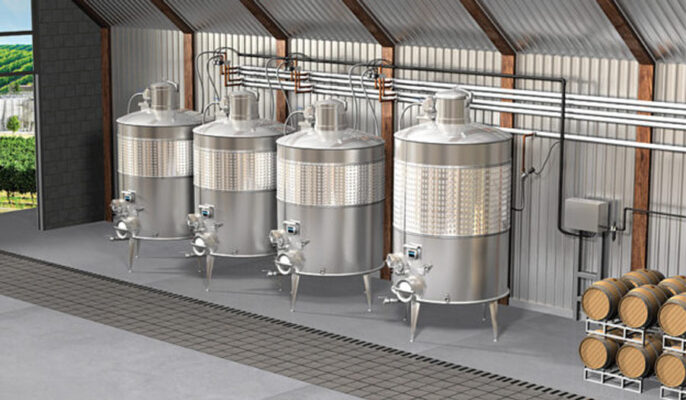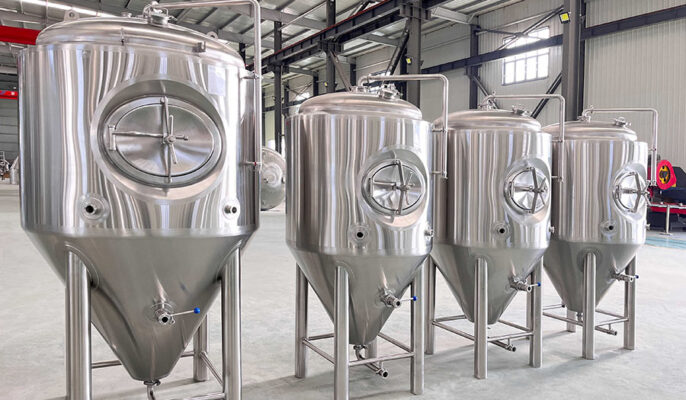A good fermentation is essential to brewing. Temperature control is an important part of this. Each yeast strain has a temperature range in which it performs best, and keeping the fermentation temperature within the yeast strain’s preferred range will yield the best results. A critical aspect of the fermentation process is maintaining precise temperature control. Proper cooling control is essential to ensure consistent fermentation conditions, enhance yeast activity, and improve the quality of the final product. In this article, we will explore the importance of conical fermenter cooling control and discuss various techniques and tools to achieve the best results.
Significance of cooling control
Temperature plays a crucial role in the fermentation process as it affects yeast metabolism, development of desired flavors and fermentation. Uncontrolled temperature fluctuations can lead to inconsistent fermentations, off-flavors, and even undesirable by-products. Maintaining a stable and precise fermentation temperature is key to producing high-quality beer.

The three main parts of the cooling system
- Temperature Controller: It allows us to control heating or cooling cycles to remove or add heat to the system.
- Cooling System: This is without a doubt the part of our system that about the most. We first thought we wanted to use a freezer/freezer that would hold our entire cone.
- Pump: Using a submersible pool pump connected to the cooling side of the temperature controller, we can pump the chilled water out of the cooler.
Cooling Technology of Conical Fermenter
Glycol Cooling System
Glycol cooling systems are used in breweries of all sizes due to their efficiency and reliability. A typical setup consists of a chiller to cool the glycol/water mixture and a network of insulated piping that circulates the cold liquid through jackets or coils integrated into the fermenter. The glycol cooling system enables the brewery to control the fermentation temperature with high precision, ensuring a stable environment for yeast activity.
Cooling jacket
Conical fermenters are usually equipped with cooling jackets, which are double-walled vessels with space between the walls for coolant circulation. These jackets can be filled with water or glycol to absorb excess heat in the fermentation vessel. Although not as precise as glycol systems, cooling jackets provide an effective method of temperature control, especially for small-scale operations.
Immersion Cooling Coil
For home breweries or microbreweries on a budget, immersion cooling coils can be a cost-effective cooling solution. These stainless steel coils can be submerged into the fermenter, where cold water or a glycol solution can be pumped in to regulate the temperature. Although less efficient than glycol systems, immersion coils can still maintain a stable fermentation temperature within a certain range.

Automation and temperature control system
To further enhance cooling control and simplify the brewing process, advanced temperature control systems can be used for automation. These systems can be integrated with cooling equipment and use sensors to watch and regulate temperature. They offer features such as programmable temperature profiles, remote monitoring and temperature deviation alerts to ensure consistent and error-free fermentations.
Best Practices for Cooling Control
- Watch Fermentation Progress: check fermentation progress and adjust temperature as needed to match the ideal working range for a particular beer style’s yeast.
- Avoid sudden temperature fluctuations: Rapid temperature changes can shock the yeast and affect fermentation. It is recommended to adjust when changing the temperature.
- Use insulation: Insulating the fermenter and cooling lines can increase the efficiency of the cooling system, reduce energy consumption and maintain a stable temperature.
In conclusion
Proper cooling control is essential to optimize the fermentation process in conical fermenters. Only by investing in the right cooling equipment and adopting best practices can a brewery ensure continuous fermentation, improve yeast performance and produce high-quality beer. Whether you are a home brewer or a seasoned professional, maintaining optimal cooling control will improve your brewing skills and produce delicious, consistent beer.




